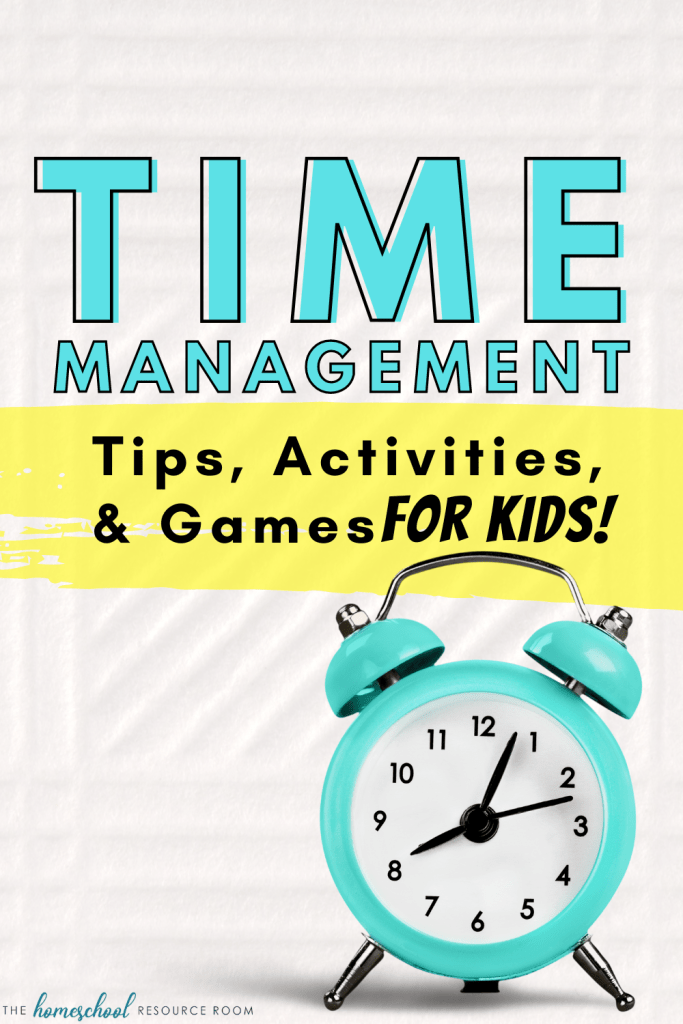This post may contain affiliate links. See our disclosure policy for details.
For kids, teens, and even adults with executive dysfunction, time management activities are essential. Otherwise, you get a morning that looks like this:
- 7am- First alarm or “wake up!” visit. They snooze.
- 7:05- Next alarm, goes off. They snooze again. “I’ve got plenty of time,” they think.
- 7:15- Another alarm, another snooze.
- 7:35- Finally get out of bed, then they spend 20 minutes trying to decide what to wear.
- 7:45- They try to brush teeth, do last minute homework, and make breakfast at the same time
- 8am- They watch the school bus drive by their house while trying to find their sneakers.
Kids with executive dysfunction aren’t TRYING to be late, frustrating, or impossible. In fact, they usually really, really want to be on time and well-organized. Instead of getting mad at them, help them find strategies to overcome their deficit and succeed despite a brain hard-wired for living in the moment.
If you want to see other executive functioning activities, I’ve got you covered! I’ve done a whole round-up on games and exercises to help build ALL areas of executive function.

Why Use Time Management Activities?
People with executive dysfunction struggle with planning and prioritizing in general, but their sense of time can be one of the biggest burdens. It’s known colloquially as “time blindness,” or an inability to sense the passage of time. When you’re in the zone on an art project, you might think only 30 minutes has passed, when really it’s been four hours. Or on the other end, you think you’ve been exercising for hours and it’s really been six minutes.
This also becomes a problem when you think about the passage of time on a broader scale. If a teacher assigns homework for Friday, someone with executive dysfunction probably can’t sense the urgency until Thursday night, even if it’s a big, multi-step project. It’s easy to over or under estimate how long things will take when you can’t “feel” what a half hour is like.
Since kids and adults with ADHD don’t have the same internal executive functions as others, they need to outsource those tasks. Here are some great time management activities, tips, and games to help you succeed.
Time Management Activities for Students

Routines
I’m not sure if there’s anything more important for someone with ADHD, Autism, or any kind of executive dysfunction than routines. There’s probably also nothing these kids hate and resist more. However, if you can push through the initial resistance and frustration, the rewards are worth it. Once your child has a rhythm, they can do some things more or less on autopilot. This means even if they don’t have a great sense of time, they can still get things done.
Clocks everywhere
When you don’t have a great sense of time, clocks should be your best friend. Keep a watch on your wrist. Hang analog clocks in every room. Heck, if you really want to get fancy, find an old grandfather clock that chimes every 15 minutes. That will help your child start to sense the passage of time!
Having so many clocks means they can casually look up and always get an idea of where they are and what they should be doing. You can also put post-it notes around the clock as a reminder for when certain things need to be done.
Chunk Assignments, Tasks, and Projects
If your child struggles to understand how to tackle large projects, time management is going to be icing on top of a struggle-cake. Help them learn to think through large projects as soon as they’re assigned.
Here’s one of my favorite time management activities. I call it imagining the future. As soon as your child is assigned a project, have them take five minutes to think about how they’ll do it. While reading the directions, have them write down answers to the following:
- What supplies will I need? Do I have all of the supplies here at the house, or will we need to buy any?
- How long will it take to collect and/or buy the supplies?
- What day will I have collected all materials by (self-imposed deadline)?
- Will I need to read anything in order to do this project? Do I have the books or articles I need, or do I need to find them online/at the library?
- How long will it probably take to find each book/article I don’t have?
- How long will it take to READ everything?
- What day will I have finished reading all my books and/or articles (self-imposed deadline)?
- What kind of project is this (writing, performance, presentation, physical product)? Or are there multiple parts?
- (If a writing project) What day will I have my outline done? How about my first paragraph? Body paragraphs? Conclusion paragraph?
- Finally, whose help will I need to complete this project? Call, text, or visit them RIGHT NOW to ask if they’re available.
Time Estimation Games
This is great for kids with a competitive streak. Have them see if they can guess how many seconds it will take them to run from your front door to the nearest stop sign (or that big tree, etc). Guess how many minutes it takes to get to grandma’s house. When they start developing a good sense of how long certain activities take, change it up and try timing new things! This works even better if they’re in charge of the stopwatch so they can visually see the seconds and minutes ticking by.
Technological Time Management Activities

Use Voice-Command
If you have an Alexa-enabled device like the Amazon Dot, a Google Home or an Apple HomePod, you’re in luck. You can yell at one of these things whenever you remember a deadline or to-do and tell it when the deadline is. Then, you can set it to remind you however many times you need, whenever you need reminders.
This is great because when I taught teens with ADHD, they requested frequent reminders from me about deadlines. I bet as a parent, you constantly feel like your child has no idea when to wake up, go to bed, do homework, or literally anything without you. Having an audio (not just visual) reminder of tasks can help remove some of that burden.
Automatic Lights
When you struggle to recognize how much time has passed, visual reminders are king. Getting a set of smart plugs allows you to plug in your normal lights and then program them on a timer. If bedtime is at 8:30, and your child needs to start their wind-down routine at 8, you can set the lights to dim or shut off at that time. Playtime’s over!
Alternatively, Amazon has come out with their Echo Glow specifically for kids. It can turn on at wakeup time (helpful for kids who can’t tell time yet, too!) and off when it’s time to sleep. It also has a “rainbow timer” function that helps kids recognize transition times and know when to shift activities. It would work great for any homeschool using the centers model, too!
For more reading on this topic:
- Impulse Control Activities for Kids (And What WON’T Work)
- Accommodations for Autism: 21 Best Recommendations
- Homeschool ADHD Schedule: 13 Hacks + A Sample Schedule
- 15 Best Sensory Toys

Hillary is a former teacher who went rogue and became a freelance writer. When not offering support and advice to homeschooling families, she tends to her own garden, family, and cat. You can connect with her on her website, homegrownhillary.com.

